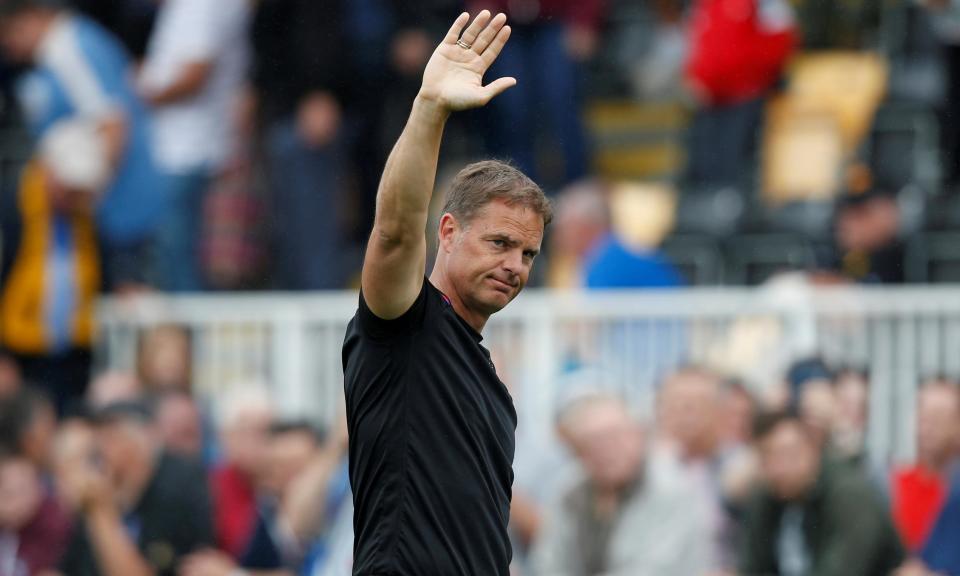Frank de Boer's managerial career died as an offering to the modern game

In the summer of 2014, Frank de Boer was perhaps the hottest young manager in Europe not named Jurgen Klopp, Diego Simeone or Pep Guardiola. He was 44 and the one-time standout Holland, Ajax and Barcelona defender had somehow managed to a win a fourth league title in 3 ½ seasons in charge of Ajax.
For most of those seasons, Ajax had played attractive soccer and he’d brought along a core of future Premier League stars: Christian Eriksen, Toby Alderweireld, Daley Blind and Jan Vertonghen.
Ajax crashed down with a big thud in 2015, when PSV ran away with the league by 17 points. The next year, it gave away the title on the final day – to PSV again. De Boer left at the end of the season, in spite of Ajax’s wish to keep him. The club had regressed and he was ready to move on, tired of rebuilding the team that was always a project and never the finished product.
He’d turned down plenty of other opportunities. Or so it was rumored, anyway. Including, apparently, with Tottenham Hotspur before it hired Mauricio Pochettino. Finally on the market, Frank de Boer landed at Inter Milan. Roberto Mancini had left just before the season and de Boer had been slotted in with pre-season all but over. De Boer lasted only two months and change, just 14 games, half of which he lost.
De Boer was damaged goods. He washed up at Crystal Palace in late June in its ambitious plan to remake itself into something it had never been before: a team that played possession soccer. De Boer was to be the man to bring about that change, even though Palace had failed to supply him with the players who could execute it. And even though, in truth, his late Ajax teams had become ever more reactive and his Inter side was all over the place.
Oh, and Palace didn’t want to wait for results. There would be no year of building a new team, no tolerance for growing pains. It all had to come good right away. In retrospect as well as real time, this seemed like a bad idea.
If Palace caught lightning in a bottle and somehow got it right from the jump, de Boer might have worked there for a fairly long time – by Premier League standings. If points were not forthcoming in short order, it was pretty plain, trouble would be immediate.
Trouble was immediate.
De Boer’s Eagles played four games and lost four games, scoring no goals. On Monday, Frank de Boer was fired. His team made the worst start in the Premier League era. The worst in almost a century, in fact.
In the span of a year, a potentially great managerial career was unmade. Ripped to shreds and reduced to a pile of old rags.
As these things go in England, the club’s list of grievances quickly made it out into the press. The hatcheting comes first. Then follows the character-assassination. Never mind that an honest assessment finds de Boer more unlucky than bad.
Within hours of his firing, the BBC had all the particulars of what supposedly went on behind the scenes. De Boer had not kept to agreements over formation, not impressed the players and not been able to fit them into the new system. Of course it was all there. Nobody airs dirty laundry on a former employee like a Premier League team.
The Sun called de Boer the worst Premier League manager ever, which is both hyperbolic and impossible to say after a sample size of four games and just 77 days.
The Independent, too, stuck de Boer in a slideshow of the least successful managers.
De Boer, now 47, is no longer a manager of great promise. He never will be again. Instead, he’s a poster boy for how quickly a career can be ruined. In the capricious business of managing soccer teams, his stock has plummeted in a relative flash. Twice over, he picked the wrong team, where there was no time for him to do the things he’d set out to do. And now he’ll be lucky to get another gig at a somewhat big club in one of the five big leagues.
Inter, plainly, was the wrong choice. The club has burned through three more managers since kicking de Boer to the curb, although it did manage to salvage a seventh place from the wreckage last season. Under Luciano Spalletti, and following another round of massive investment, the storied club is perfect in its start to the Serie A season.
Palace, for that matter, was a club with an interesting plan and maybe even the right manager to execute its ideas, but no stomach to see it through. In de Boer’s final game, Palace was deeply unlucky not to get a result, as it had utterly dominated Burnley away from home. But some kind of ultimatum had been given, and that was that.
Now the club fears relegation from the Premier League’s all-you-can-eat money buffet. And it would rather suffer through a season of dreariness under Roy Hodgson, perhaps the most boring manager (and man) of our time, than take any further risks. A manager who doesn’t win today is gone tomorrow. Even if he might have made the club better next week.
The Premier League’s managerial wheel has crushed another upstart hoping to ride it. It will take years for him to rehabilitate his reputation, if he ever does. He was given short shrift in successive jobs, shunted because he’s a manager who builds things in a time when only ready-made results count.
Frank de Boer is unemployed again.
Leander Schaerlaeckens is a Yahoo Sports soccer columnist and a sports communication lecturer at Marist College. Follow him on Twitter @LeanderAlphabet.



